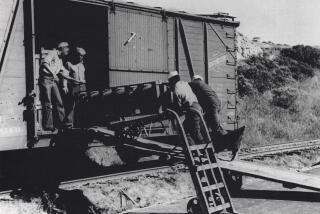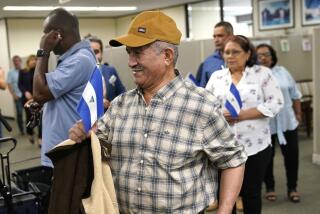Ex-Officer Admits Atrocities by Argentina
- Share via
BUENOS AIRES — About 2,000 political prisoners were thrown alive from navy aircraft into the Atlantic Ocean during Argentina’s 1976-83 “Dirty War,” a retired naval officer has charged.
The victims, most of them leftists considered subversive by the former military dictatorship, were drugged and tossed naked into the sea off Argentina’s coast, retired Lt. Cmdr. Adolfo Francisco Scilingo said in an interview published Friday in the newspaper Pagina 12.
About 4,000 people were killed and at least 9,000 disappeared during the Dirty War when a repressive rightist regime waged a brutal campaign against leftists and political dissidents.
Although many Argentines have long believed accounts of prisoners being killed in such a manner, Scilingo’s comments marked the first time a military officer has publicly acknowledged such acts.
Army Gen. Mario Candido Diaz, head of the nation’s joint chiefs of staff, said the accusations “did not merit a reply.” He said Scilingo had “lost all his qualities as an officer and a gentleman.”
The general did not address the truthfulness of the allegations.
Scilingo said he took part in two flights in June and July, 1977. He described in graphic detail how the victims, many so weak from torture and detention that they had to be helped aboard the plane, were injected with a sedative. He said he and another officer undressed the unconscious victims and threw them into the ocean.
President Carlos Menem, who in 1991 pardoned high-ranking officers imprisoned for human rights abuses in the Dirty War, called Scilingo “a crook,” an apparent reference to charges against him of fraud and car theft.
Scilingo said the flights occurred most Wednesdays in 1976 and 1977, with as many as 20 prisoners thrown into the ocean each time.
The whereabouts of many Dirty War victims’ bodies remain a mystery. Mothers of the Plaza de Mayo, whose children were among those killed, march weekly to demand a government investigation.
More to Read
Sign up for Essential California
The most important California stories and recommendations in your inbox every morning.
You may occasionally receive promotional content from the Los Angeles Times.









